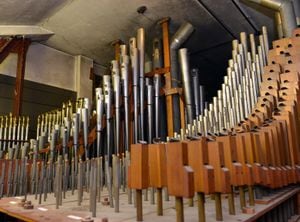'No alternative': Wolverhampton Council defends decision to scrap historic organ pipes
There was “no viable alternative” to scrapping the “severely contaminated” pipes from the Civic Hall’s organ, Wolverhampton Council has insisted.

The authority came under intense scrutiny last week after it was revealed the 6,241 pipes belonging to the “historic” and “priceless” organ had been dumped at a landfill site.
The organ was the largest of its kind built by British firm John Compton and Company and had sat in the Civic for more than eight decades.
It was due to be removed and restored before Wolverhampton Council baulked at the £2 million fee and opted to have it scrapped.

It has since emerged that professional full-time organ builder Peter Hammond, members of the Paul Kirners Musical Palace in Wales and several organ groups - including the Cannock Chase Organ Club, had all offered to take the pipes from the council to try to restore them free of charge.
All offers were rejected.
The council insists the pipes were "severely contaminated" with asbestos and there was no way they could have legally given them to enthusiasts to attempt to restore, even if they did offer.
'Improvements and enhancements'
Councillor John Reynolds said: “We have committed £38.1 million to a refurbishment design programme that will ensure the necessary improvements and enhancements are sympathetic to the history of our much-loved art deco, Grade II-listed halls.
“We have worked carefully to preserve the original external and internal features from this iconic 1938 building, including the Compton Organ console, and we are working closely with Historic England, who are supportive of our plans.
“I share the people’s sadness that the organ pipes could not be saved, but there genuinely was no viable alternative.

"The reality is that the 6,241 pipes, which are not visible and sit behind a wall in an enclosed chamber, were severely contaminated by the extensive presence of potentially deadly asbestos.
"This is an issue throughout this 80-year-old building. This is an historic problem which was not caused by the current works.
“To restore these pipes safely would have cost an extra £2 million that we simply do not have and nor did any other interested parties.
"For both health and moral reasons we could not pass on the pipes to anyone else.
WATCH: Dudley Savage MBE plays the organ
"Legally, the Control of Asbestos Regulations is criminal law and cannot be bypassed by a signed waiver from any person or group, no matter how well intentioned.
“We therefore had to send the pipes through a licensed hazardous waste carrier to a contamination landfill facility that has a specific permit to accept asbestos waste."
The organ's console has been kept in tact and will be preserved, but an organ expert told the Express & Star: "It is like a priceless, rare car has been sent to the scrapyard, and they've offered the steering wheel in return."





